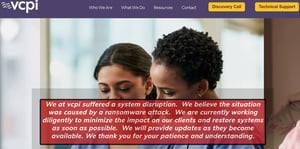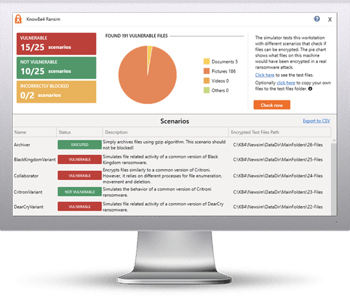 Brian Krebs reported: "A ransomware outbreak has besieged a Wisconsin based IT company that provides cloud data hosting, security and access management to more than 100 nursing homes across the United States. The ongoing attack is preventing these care centers from accessing crucial patient medical records, and the IT company’s owner says she fears this incident could soon lead not only to the closure of her business, but also to the untimely demise of some patients."
Brian Krebs reported: "A ransomware outbreak has besieged a Wisconsin based IT company that provides cloud data hosting, security and access management to more than 100 nursing homes across the United States. The ongoing attack is preventing these care centers from accessing crucial patient medical records, and the IT company’s owner says she fears this incident could soon lead not only to the closure of her business, but also to the untimely demise of some patients."
Milwaukee, Wisc. based Virtual Care Provider Inc. (VCPI) provides IT consulting, Internet access, data storage and security services to some 110 nursing homes and acute-care facilities in 45 states. All told, VCPI is responsible for maintaining approximately 80,000 computers and servers that assist those facilities.
At around 1:30 a.m. CT on Nov. 17, unknown attackers launched a ransomware strain known as Ryuk inside VCPI’s networks, encrypting all data the company hosts for its clients and demanding a whopping $14 million ransom in exchange for a digital key needed to unlock access to the files. Ryuk has made a name for itself targeting businesses that supply services to other companies — particularly cloud-data firms — with the ransom demands set according to the victim’s perceived ability to pay.
In an interview with KrebsOnSecurity today, VCPI chief executive and owner Karen Christianson said the attack had affected virtually all of their core offerings, including Internet service and email, access to patient records, client billing and phone systems, and even VCPI’s own payroll operations that serve nearly 150 company employees.
The care facilities that VCPI serves access their records and other systems outsourced to VCPI by using a Citrix-based virtual private networking (VPN) platform, and Christianson said restoring customer access to this functionality is the company’s top priority right now.
“We have employees asking when we’re going to make payroll,” Christianson said. “But right now all we’re dealing with is getting electronic medical records back up and life-threatening situations handled first.” Full story at KrebsOnSecurity
 Here's how it works:
Here's how it works:




